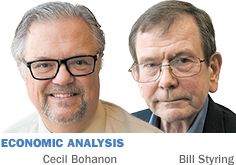Subscriber Benefit
As a subscriber you can listen to articles at work, in the car, or while you work out. Subscribe Now
 A common economist joke is, “If all the economists in the world were laid end to end … they couldn’t reach a conclusion.” Funny, but not quite true. Economists agree on quite a lot of things. Chief among these are the benefits of free trade.
A common economist joke is, “If all the economists in the world were laid end to end … they couldn’t reach a conclusion.” Funny, but not quite true. Economists agree on quite a lot of things. Chief among these are the benefits of free trade.
At least since the time of Adam Smith, it has been recognized that specialization and trade are the keys to prosperity. And at least since that time, economists have had a hard time explaining why this is true. To be sure, most people can see why the U.S. is better off importing coffee, but why all those other goods that could easily be made in the United States? Enter Billy Rose.
Billy Rose was a Broadway showman who produced plays like “The Ziegfield Follies” and penned songs including “Me and my Shadow.” He began his career, however, as a stenographic clerk to Barnard Baruch in World War I. Billy was an outstanding stenographer—capable of dictating 150 words per minute. He was also an outstanding typist—having won numerous typing contests of the period.
Yet when Rose began producing musicals, he hired a secretary. So why would the world’s fastest stenographer/typist hire someone else to take and type his letters? The answer is simple: He had better things to do. His time and effort were put to better use organizing, arranging and directing his productions.
In a similar vein, American manufacturing might be very good at producing basic goods, like aspirin. In fact, our facilities might be able to churn out more aspirin per man hour than any factory in the world. Yet it might be in our interest to import aspirin, because our facilities are better suited to producing newer, more complex medicines.
This principle that trade makes us better off even if we are absolutely better at doing everything is called “comparative advantage.” We are better off specializing in what we are relatively better at doing. Billy Rose hired inferior secretarial help so he could specialize in producing musicals.
Congress is about to consider the TransPacific Partnership. TPP is a freer trade agreement among the U.S. and 12 Pacific Rim nations. We don’t know details. It might be so larded up with extraneous “riders” as to outweigh any trade gains. But at the least, Congress should start out with the strong presumption that any deal that frees up trade is a good thing.•
__________
Bohannon is a professor of economics at Ball State University. Styring is an economist and independent researcher. Both also blog at INforefront.com. Send comments to [email protected].
Please enable JavaScript to view this content.
